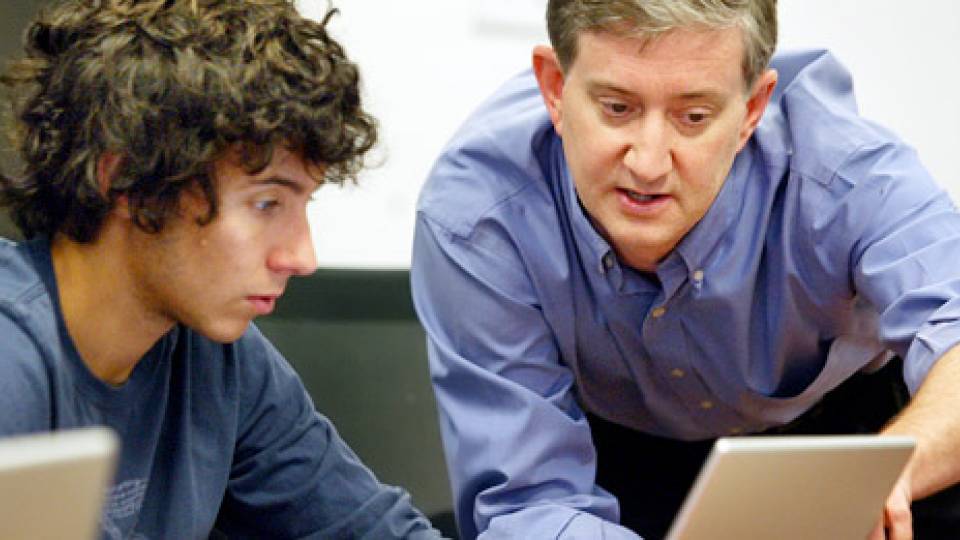Amid a growing number of copyright-infringement lawsuits filed by music and film producers against college students, attorneys from both sides of the issue debated the future of online sharing of songs, movies and other files at an event organized by Princeton students.
Dean Garfield, vice president and director of legal affairs of the Motion Picture Association of America, and Wendy Seltzer, intellectual property attorney for the Electronic Frontier Foundation, agreed on the value of copyright protection but diverged on nearly every other subject during an hour-long debate at the Friend Center on Friday, May 6.
During the debate, called "Fear-to-Peer: A Debate About File-Sharing on Campus," both Garfield and Seltzer agreed that copyright laws have long played an important role in encouraging creativity. But they disagreed about the appropriate consequences of using or creating the file-sharing technologies or how to move forward in a society with pervasive access to such technology.
File-sharing, the trading of music and video via the Internet or other computer networks, has sparked disagreements in courts and on college campuses around the country as people share copyrighted materials without paying for them. The recording and motion picture industries have sued college students for allegedly using such networks to illegally share copyrighted materials. Some of the recording industry suits have targeted Princeton students. (The University's published guidelines on copyright protection are available online.)
"I don't think that lawsuits, particularly lawsuits against individuals, including college students, are the best way to enforce copyright and ensure payments to those who create artistic works," said Seltzer. Arguing that industry should "offer the carrot before the stick," she advocated the creation of commercial services that make it more attractive for people to pay for the service than to use free networks.
Technologies have historically presented problems for copyrights, Seltzer said. The piano roll, the radio and the VCR were all “disruptive technologies” that raised fears that they would seriously damage businesses that depend on copyrights. "But in each case, we didn't kill off those technologies," she said. "We found compromises -- whether legislative changes or industries working together -- to find ways to compensate artists while letting the new technologies advance."
File-sharing presents a similar challenge, she said. "Instead of killing off that new technology, let's find ways for people to pay for it."
Garfield assured the audience that the recording and movie industries do not intend to banish file-sharing, or "peer-to-peer" networks, which facilitate the sharing of audio, video and other digital media. "Technology is not the enemy," he said.
Yet technology is clearly used to violate copyright laws, he said. "The legal aspects are the simplest part" of the subject, he said. “Just because you can do it in your dorm room without anyone seeing doesn’t mean it isn’t wrong.”
In addition to individual users, companies such as Grokster Ltd. that provide peer-to-peer services may be held liable when people use them in illegal ways, such as for downloading movies and software, he said.
“When you find out the product you created is being misused, you bear some responsibility to address the impropriety,” he said.
Garfield, who received a master's degree from Princeton's Woodrow Wilson School of Public and International Affairs and formerly worked for the Recording Industry of America, has led several key lawsuits related to file-sharing. Seltzer, who is a fellow at the Berkman Center for Internet and Society at Harvard Law School, has helped to defend such cases through her work at the Electronic Frontier Foundation.
The debate was organized by a group of students -- seniors Stacy Chen and Daniel Peng and graduate students Harlan Yu and Alex Halderman -- who participated in the course "Information Technology and the Law" taught this semester by Edward Felten, professor of computer science. Felten moderated the debate, which was sponsored by the School of Engineering and Applied Science, the Woodrow Wilson School and the Department of Computer Science.
“I hope it helped people clarify what was going on with the lawsuits,” said Peng, who was subject to one of the music industry's early file-sharing suits in 2003. " I think there is a general acknowledgement that there is a need to compensate the creators. There is not a consensus about what we should do, and that is the crux of the debate."



